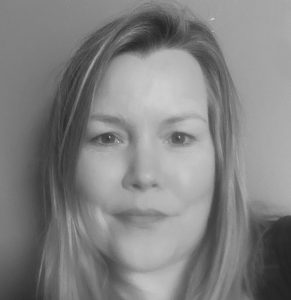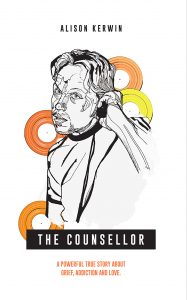The Accidental Author: How Writing Helped Me Come To Terms With My Brother’s Death
 The accidental author: how writing helped me come to terms with my brother’s death
The accidental author: how writing helped me come to terms with my brother’s death
I always hoped that I would one day find the time to write a book. In the same way I wistfully day-dream I’ll retire by the sea and spend lazy days walking a dog up and down a beach. And I don’t even have a dog!
Yet, here I am, an author. Part of that illustrious group of people who tick writing a book off their bucket list. And while I feel tremendous pride that I made it to the end—nothing beats that feeling of holding a copy of your book in your hands—I feel incredibly sad too. Because I had the unfortunate task of writing the book I should never have had to write.
My book, The Counsellor, tells the story of my brother’s addiction to heroin and his untimely death in November 2019. I didn’t consciously plan to write about it but like many writers, writing came to me. I vividly remember how it began. I’d settled myself down in my kitchen to write his eulogy. Armed with a fresh steaming coffee, I fired up the laptop and a blank page began glaring at me expectantly. I had a quiet space away from the children and I waited for the words to come. And yet, there was nothing.
The cursor flickered on and off—I’m waiting it told me impatiently—yet still, nothing. I took a large gulp of my coffee and forced my fingers to connect with the keyboard in the hope that the eulogy I’d been playing around with in my head might fall onto the page but it did not. Instead, out came a letter to my brother. None of it was planned or premeditated, none of it was conscious thoughts or feelings but what I wrote was raw, unadulterated pain. Sadness at losing him, anger at him leaving me and above all, deep regret that I had been unable to save him.
When I read my words back I cried out loud, alone in my kitchen, because every single word rang true. It was less than two weeks since we’d lost him and I hadn’t allowed myself to even consider what was hurting me the most but then suddenly it was looking back at me from the screen. I should have stopped him. I had failed.
Once the writing lid came off I couldn’t stop. I found myself writing, writing, always writing. I was journaling on the train to work, a lame attempt to stop myself crying in front of strangers (it didn’t work!), then musings about his past while I was up in the night unable to sleep. I was documenting what had happened, reliving traumatic memories such as the phone call from my sister and then the long drive to tell our parents they’d never see their son again. Despite the pain I forced myself to note down the details.
It was somehow cathartic to catalogue them and work through them on the page. Like if I could replay it in slow motion I got to give each moment the gravitas it deserved because it was grief and every second of those early days mattered. It showed me, him, you, how loved he was. If we grieved that hard, if it hurt that much, he had to matter, right?
My grief was complicated because it was sudden and unexpected and also tinged with shame. Somehow it felt like losing someone to addiction would be perceived as less catastrophic than losing a loved one to cancer. Almost as though they deserved it somehow. That’s the kind of thing that goes through your mind. You feel as though your grief may not be as valid as your loved one had the power to control their addiction. At least, that’s how I felt.
So I wrote my grief but my thoughts around addiction too. At that point, I didn’t know whether it was his story or mine but it didn’t matter because I didn’t feel I was controlling it, the words were controlling me. With each page came a new revelation, an understanding about what had led him down a path which ended up ending his life and ultimately, an acceptance that it was never my responsibility nor did I have the power to save him from himself.
Writing most definitely became my therapy. My way of exploring my own thoughts and feelings and trying to gain an understanding of other peoples. Somehow writing words on a page brought me clarity and also released me from the guilt that had engulfed me in the aftermath of his death.
And then I put it out there, making myself more vulnerable than I ever had before. Hoping and praying that my words might just land with someone who needed to hear them. That the benefit of my experience might just help someone else. So I sat back, riding high on a tide of anticipation and excitement wondering what joy the release of my first book might bring to me… but what came was unexpected.
For suddenly I could be still. This place that was so occupied by writing and planning and plotting was now quiet. And in its place, I could reflect on all I had been through and all I had learnt and with all that knowledge and exploration I could say to myself, with complete confidence, it’s time Alison. It’s time to move on.
—
Born in 1977, Alison Kerwin grew up in a small town called Leyland in the North West of England. She spent her formative years living in a three-bed semi with her mum, dad, brother Danny, and sisters Rachael and Claire.
Considered ‘the posh one’ by her siblings—as her kids eat houmous and fajitas—she currently lives in Birkdale, Southport with her husband Eddie, children Peter and Lily, and their pet rats, Remy and Rizzo.
The Counsellor is Alison’s first book.
Twitter: @alisonkerwin
Facebook: https://www.facebook.com/thecounsellorbook
Instagram: https://www.instagram.com/thecounsellorbook/
Available to buy from Amazon: https://www.amazon.co.uk/Counsellor-powerful-story-about-addiction/dp/1838295402/ref=tmm_pap_swatch_0?_encoding=UTF8&qid=1606296485&sr=8-1
THE COUNSELLOR
 A powerful true story about addiction, grief and love. It’s painful to watch someone you love self-destruct, but it’s worse learning to accept they’re never coming back. Danny was the brightest star. Adored by his family, he had a strong moral code and a powerful desire to help others—but his own demons were never far behind.
A powerful true story about addiction, grief and love. It’s painful to watch someone you love self-destruct, but it’s worse learning to accept they’re never coming back. Danny was the brightest star. Adored by his family, he had a strong moral code and a powerful desire to help others—but his own demons were never far behind.
Piece by piece, drug addiction stole Danny away, leaving nothing but pain behind. In this raw and deeply personal account, Alison Kerwin shares the heartache of trying to support her brother through his addiction, the guilt of feeling responsible for fixing him, and the devastating impact his death had on her entire family.
During their last conversation, mere days before he died, Danny told Alison he’d like to be a counsellor. She scoffed at the time, but promised to look into it for him, as she always did. Still, she couldn’t pretend it didn’t make her laugh. But she was wrong. Through his death, Danny taught her hard lessons about addiction and mental health, and made her realise once and for all that the only person you can ever hope to fix is yourself.
Category: On Writing























